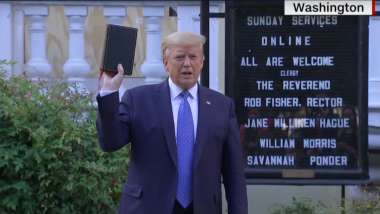Trump and evangelicals - round two

The 2024 US Presidential election kicked off last week with a huge win for Donald Trump in the Iowa caucuses, as he seeks the Republican Party's nomination. His selection as Republican candidate is starting to feel inevitable, especially now that Ron DeSantis – one of his main opponents – has withdrawn from the race and thrown his support behind Trump.
A staggering 53% of those calling themselves white evangelical Christians said in an Iowa exit poll that they voted for Trump. If this is repeated across the country, he may well be re-elected to the presidency on the back of highly tribal faith-based endorsements.
It is genuinely baffling to most British Christians that so many of our US counterparts can support a man of Trump's – hardly Christlike – character and actions. And this time round, the prospect of his election threatens to destabilise the entire globe, as he proposes to withdraw support from Ukraine and pull out of NATO.
It's a source of comfort and encouragement to me that the UK is far less politically tribal than the US on religious lines. I have many cross-party friendships with Christian MPs. We can share a faith while disagreeing on politics.
But the depths of US divisions have trampled down the middle ground of politics. We can see this in the UK to an extent following the lengthy Brexit disagreements, the Corbyn years and the current (successful) attempts by the Reform party to wrench Conservative immigration policies onto their agenda.
In America the divisions are deeper and wider. There, politics appears to have turned into a question of salvation: vote for whichever leader is most likely to save you from the threats you believe are battering at the door.
Trump's team have capitalized on a fear, held by many right-leaning white Christians, that liberal, Islamist and Marxist forces are seeking to destroy society. They have used "Make America Great Again" to promote a cultural Christian identity that their supporters believe is under threat. It is based around saving America from a hostile world. And they are using highly religious, quasi-Messianic language, such as in the widely-shared "God Made Trump" video which paints him as God's handpicked caretaker ruler to preserve American culture and "a shepherd to mankind who won't ever leave them or forsake them."
Incredibly to us, this seems to be hitting the mark. One Trump supporter was quoted in the New York Times as saying: "he is the only saviour I can see". Another stated that the election is "part of a spiritual battle" with Trump expected to dish out "retribution against all those who have promoted evil in this country."
Of course many also oppose Trump's nomination. A national survey giving voters a Trump vs Biden option in 2024 show 76% of white evangelical Protestants supporting Trump, as well as more than half of white Catholics and white non-evangelical Protestants. By contrast, 79% of Black Protestant voters support Biden, along with two thirds of religiously unaffiliated and non-Christian religious voters.
I am certainly not suggesting that people of faith should only vote Democrat nor am I suggesting that no Christian could ever vote for Trump, but I do fear that many white evangelicals are being deceived by Trump. In dismissing his character and actions as irrelevant, they often quote Jesus's words from Mark 12:13-17. The Pharisees tried to catch him out by bringing him a Roman coin and asking whether they should pay taxes to Caesar. His reply was: "give back to Caesar what is Caesar's, and to God what is God's".
These verses are used to argue that people should keep faith in a private sphere. By all means, show love, kindness and forgiveness in your personal life. But you can safely abandon any annoying Christian values in the political fight. In that context, it's argued, it is fine to act with malice and anger, stoking division and culture war. Different rules apply and the end justifies the means.
But I don't think Jesus meant this. He surely meant something far more radical, which is equally disturbing and unpalatable to both left and right. You see, the coin bore Caesar's image and so Jesus shrugs and says that it should be given to Caesar. But Genesis 1 tells us that, unlike the coin, humans bear God's image.
Jesus is saying here that you belong - and should give yourself entirely - to God. Christians are called to apply and live out Christ's teachings in every part of our lives. You must not then fit your faith to conveniently suit your politics, but must humbly tailor your politics to be faithful to the One whose image you bear.
So let's be praying for these key US elections, and for Christians to use their votes wisely and faithfully. And let's also pray for those of no faith not to be put off Christianity – or Christ – by the willingness of so many to treat Trump as the new Messiah.
In the Screwtape Letters by CS Lewis, the Devil attempts to lure a new believer away from the faith by making him focus on the weirdness of some Christians, rather than on the wonder of the real Jesus. Let's pray that non-Christians are not put off from investigating Jesus's direct appeal to them, which can be found in John 3:16.
Tim Farron has been the Member of Parliament for Westmorland and Lonsdale since 2005, and served as the Leader of the Liberal Democrat Party from 2015 to 2017.Tim is also the host of Premier's 'A Mucky Business' podcast. His new book A Mucky Business: Why Christians should get involved in politics is published in November.











